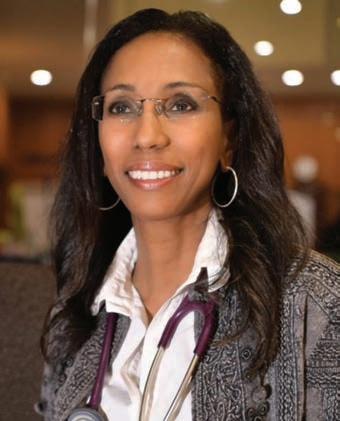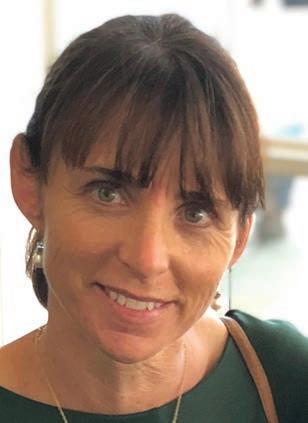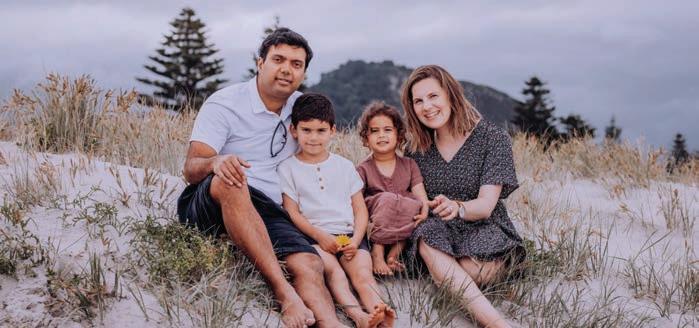
9 minute read
Deep diving into our IMG workforce
Elizabeth Brown | Senior Communications Advisor
As we know, New Zealand is heavily reliant on overseas-trained medical specialists. They make up 43% of our senior medical workforce – the second highest proportion in the OECD.
They are critical to keeping our health system going and to the sustainability of the workforce in meeting the country’s growing health needs. Just how reliant our smaller regional DHBs are on international medical graduates (IMGs) is clearly illustrated below. Last year the Medical Council noted a marked increase in overseas doctors seeking specialist registration. However, historically, turnover of IMGs is high, and there is little data on what actually shapes their experience of working in New Zealand and how we can better recruit and retain them.
This year ASMS will be embarking on research to better understand why IMGs come to New Zealand, what distinct challenges they face settling and working here, and what specific support they and their families need to help them stay in the country. Ahead of this research we spoke to three IMGs to get some initial thoughts.
Wairarapa Whanganui Tairawhiti Northland MidCentral Lakes Bay of Plenty Waikato Southern West Coast South Canterbury Hawke’s Bay Taranaki Nelson Marlborough Waitemata Capital & Coast Canterbury Hutt Valley Auckland Counties Manukau
0%
IMG DISTRIBUTION
10% 20% 30% 40% 50% 60% 70% 80%
Overseas-trained % where country known NZ trained
Proportion of IMGs among DHB SMO workforce as at 30 June 2021. (TAS) 90% 100%

Dr Carolyn Providence
Carolyn is an internal medicine specialist who came to New Zealand ten years ago with her husband and young child. She left Barbados and the United Kingdom, where she trained and worked for over a decade.
The couple wanted a country which offered good standards of education and living, and somewhere they could advance their careers and happily raise a child.
“We thought New Zealand would provide us with all these things, and on paper it looked like the perfect place,” Carolyn says. With active recruitment of IMGs into the regions, they landed jobs in provincial New Zealand. Carolyn says transitioning into regional New Zealand was not easy, amplified by delays in the registration process and having no family support in the country. In her opinion, cultural integration, one of the most important aspects of transition, was managed poorly. While she acknowledges it is a difficult thing to achieve due to the diversity of IMGs and the significant interregional variability in New Zealand, she felt getting this right was critical to successful retention.
In addition to the challenges of integrating, she soon encountered what she terms “insidious injustices” which led to professional isolation when she tried to address them.
“There were a lot of micro-aggressions from colleagues, which a decade ago were not addressed, and there were no avenues for redress or ability to voice concerns without fear of retaliation,” Carolyn says. There was also “moral injury”. She recalls being dismayed by comments from those around her which disparaged minority groups and fed into inequitable provision of care to patients. It was something she hadn’t expected to encounter in New Zealand.
She believes having a dedicated group to help IMGs settle would be helpful. In her view it could offer independent professional support and follow up, as well as provide a range of resources, useful information, and networks.
“It should be a requirement to have something like that in place for people once they get here, and it should be monitored and resourced. A lot of the strain on IMGs comes from the psychological strain of transition to different cultures. I cannot overstate the vulnerability of IMGs during transition,” Carolyn says.
She also favours the idea of formal training modules for hospitals to roll out to IMGs, to describe the differences and nuances of the New Zealand health care system and cultural expectations. Being separated from family is one of the biggest challenges for IMGs and brings its own set of pressures. “There is no one to fall back on to help deal with things like childcare or day-to-day stresses, and there’s often constant guilt or anxiety over ageing relatives at home.”
“If you can’t connect with your family, the risk of not being able to stay goes right up,” says Carolyn. The couple relocated to Auckland where her experience has been overwhelmingly positive. Carolyn is excited and fully supportive of ASMS’ plans to measure and gather data on the IMG experience because while she’s hopeful things have changed over the past ten years, in her view there is still a lot of room for improvement. “With such a reliance on IMGs, looking after them should be an obvious thing to do,” she says.

Dr Erin Doherty
Erin is an internal medicine specialist from the US who, along with her ED specialist husband and three children, arrived in New Zealand eight years ago to work in Northland. She says moving to New Zealand and working in a completely different health system is a huge undertaking, and finding the right support wasn’t always easy. “If you’ve been working in Australia or the UK, you’re going to have a sense of how the system works and what a patient pathway might be, but if you’re coming from any other system, unless it’s UK-based, it’s going to be completely different and there’s nothing to guide you.” “No one told me really basic, practical things apart from broad overviews about how it’s a universal system – no one walked me through what that actually meant. Eight years down the track I still feel like I’m bumping into walls sometimes.”
She was thrown into the inpatient service, taking call from day one with absolutely no orientation. She says while things may have now changed, it also took a year to get enrolled in the basic hospital orientation for all new employees. “Locum agencies and hospitals advertising positions spend time chasing you and telling you how
much they want you, and then you get dropped into the system with little support.” Erin believes it would be helpful for IMGs if there was a targeted online manual or video which outlined specific and practical differences between the New Zealand health system and others. She said it would be even more meaningful if it was done on a culture-to-culture basis so that someone from your own country of origin could share their experiences and observations in a relatable way. As an American, Erin also says she didn’t appreciate the subtle cultural differences or attitudinal barriers she would face.

“Kiwi culture is a bit stoic, and it’s like, ‘Harden up and take your concrete pills’. People in the States are more expressive and emotional and give hugs easily. Here you just don’t touch people – it’s way more reserved.” Then there are the fundamental everyday life adjustments, which Erin feels DHBs need to give more consideration to when welcoming new IMGs into their new roles.
“The DHB had both of us starting our new jobs on July 14th, which unbeknown to us was right in the middle of the school holidays. We were fresh here, didn’t know anybody and our kids were 6, 9 and 12. There was no school and we didn’t have a babysitter – we had no idea what to do.”
Erin felt lucky to have had a good friend who grew up in New Zealand but had lived in the States come up to Whanga - rei and help her navigate basic things like supermarket shopping so she could find the things she needed. Erin admits moving her family to New Zealand and working in a different health care setting was more difficult than she’d anticipated. She is keen to see more resources made available and better processes put in place so that IMGs feel “super welcome and super supported”.
ASMS will be surveying our overseastrained members later in the year. We are also interested in contacting IMGs who have left New Zealand to involve them in the survey. If you know anyone and can help us contact them, please get in touch with our Director of Policy and Research, Dr Charlotte Chambers (charlotte.chambers@asms.org.nz). Dr Mohana Maddula with his family at Mount Maunganui before heading back to the UK
Dr Mohana Maddula
Mohana is one of those valuable IMGs who has just been lost to New Zealand. He recently returned with his young family to Britain, saying Covid-19 and Government immigration policy combined to force his hand. He came to New Zealand with his wife and baby son in 2016 to take up a job as a geriatrician at Tauranga Hospital after training in the UK and spending two years there as a consultant. Initially the plan was to stay in New Zealand only for a few years, but they liked it so much they decided to settle long term, built a house, and had another child.
Mohana says he didn’t have any problems adjusting to living and working in New Zealand and felt well supported and welcomed by his DHB in terms of his induction and orientation. He says the systems were very similar to what he was used to in the NHS, with happily less bureaucracy. The one improvement he would make would be to have cultural competency training as part of his induction programme, rather than a few months in.
Overall, he felt professionally satisfied. He was taking on leadership positions, and his family was enjoying everything the Bay of Plenty lifestyle has to offer. As an only child, and with his mother living in India, what really changed things for Mohana was Covid-19 and the difficulties of not being able to travel or bring family here. The big problem was the parent category. The Government has reiterated that no decision has been made on when the programme will re-start, and it is not part of the border re-opening plan. “Even in the lead up to Covid I was trying to bring Mum over but couldn’t get longer-term visas for her. They were about to reopen the parent residency category just before Covid hit, but it’s still closed. During Covid you couldn’t even apply for a visitor visa, so essentially there was no way for her to come to New Zealand.”
When his mother got sick last year, it fell on him to take care of her, but he didn’t want to leave because he didn’t know when he could come back. In October he decided to resign. “In terms of retaining IMGs, as lovely as New Zealand is, the Government needs to pay attention to immigration options for families and parents,” Mohana says.
“It’s really important that you do whatever you can to retain the overseas-trained workforce, but current policies are not supportive of that. I know of at least 2–3 other specialists where I worked who are returning for precisely the same reasons. Covid made it all worse.”
Mohana isn’t ruling out returning to New Zealand in the future, saying it offers a great work–life balance, but with the UK allowing visitor visas, his mother can now join them at their new home in Cornwall.
“Having family around is more important at the moment, and it’s a shame the immigration policies in New Zealand could not support that.”










